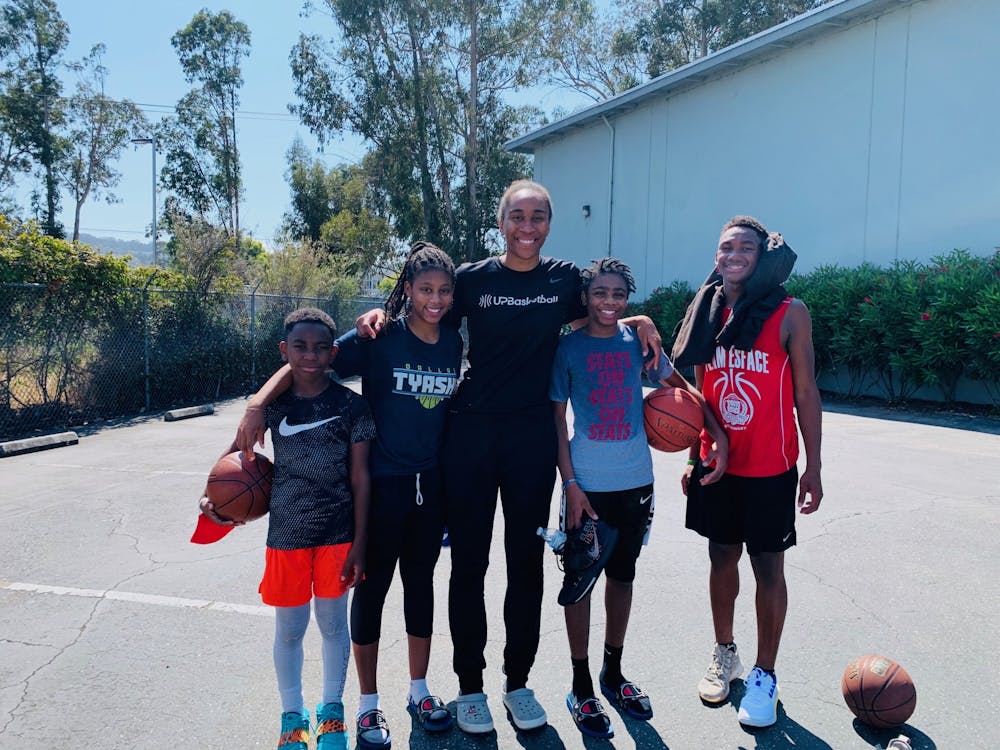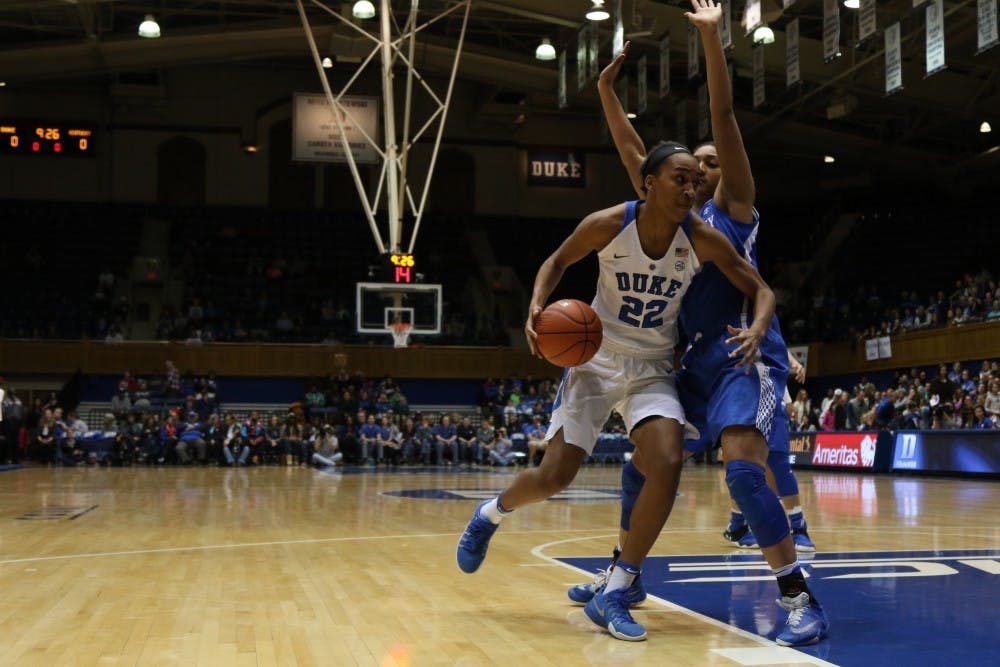Former Duke women’s basketball star Oderah Chidom had always wanted to give back to her community. She just never quite knew how.
But when Chidom met Jacqueline Diep, she finally found that opportunity.
In the spring of 2019, Diep co-founded The Big Homie Project, a nonprofit focused on providing Black and Brown kids in underprivileged communities mentorship from professionals in areas that often lack diversity. As soon as Chidom spoke with Diep, she knew this was something she wanted to be a part of.
“When I met [Diep], and she has a vision that is basically her baby, we had a lot of the same aligning virtues,” Chidom said. “I got brought on board basically because we share that alignment, and I want to help the community and create opportunities and create platforms and be a mentor in a sense.”
Providing mentorship
While Chidom and Diep grew up in differing backgrounds, the two shared one common sentiment: they wouldn’t be where they are today without the help of strong mentors growing up.
Diep, a San Jose, Calif., native, grew up in foster care from the age of 11 until she was emancipated at age 17. But thanks to her social worker, teachers and, in her words, “people who just really cared about me,” she was able to graduate college and get her MBA from the University of Southern California.
After finishing business school and moving back to the Bay Area, Diep started to get involved in helping the nearby community of East Palo Alto, Calif., a city struggling to keep up with its booming neighbors.
Her work began with volunteering at the Boys and Girls Club of the Peninsula. But thanks to the inspiration of one of her best friends Auriel August—a Duke alumna, one of the few Black doctors at Stanford and the first mentor involved with The Big Homie Project—her vision took off.
Soon, Diep co-founded The Big Homie Project alongside Remi Sobomehin, a Stanford alumnus and Director of Volunteerism at the Boys and Girls Club of the Peninsula.
“I think there’s huge value in showing other Black and Brown kids people who look like them who have broken barriers or who have overcome certain circumstances so that they know what it takes to actually do that,” Diep said. “I'll never ever tell you I know what it feels like to be a Black person. I don't. I know what it feels like to be homeless. I know what it feels like to be a foster kid…. But I will never ever know what it feels like to be a Black woman or a Black man.
“And so a lot of my friends in my Rolodex are folks who work in spaces that lack diversity—they're part of the underrepresented. And they're good people. They might not know what to do as far as being able to impact and give back but that's where I come in.”
After officially starting the nonprofit, Diep used her and August’s vast networks to create mentorship programs and events in a variety of different industries, from medicine to sports.
One of those events included the Aaron Gordon basketball clinic, for which Diep had a mere 12 days to plan but worked tirelessly on to make it happen. The clinic was how Diep met Packie Turner, Gordon’s trainer, and the two worked together over the next few months on other events similar to the clinic.
Turner also trains Chidom, who was in the gym one day this summer when Diep walked in.
“We organically started talking about helping out within the Black community,” Chidom said. “And she mentioned a nonprofit that she operates. I was super interested to learn more about it and how I can help out and kind of really talk about the details. So the next day after we met, we were texting and talking on the phone all day...and I really bought into her vision that she had going on, and it kind of just took off from there.”
Chidom acknowledges that the recently-heightened awareness surrounding the struggles of marginalized communities has allowed her to look in the mirror and see the privileges that she had throughout her youth, making her even more eager to get involved.
“I had a lot of support growing up to get accolades,” Chidom said. “In high school, I had an amazing platform and I didn't get there by myself. Nothing was done by myself…. I was blessed enough to have a lot of people in my life to support me and help me get there, and I would just love to be that in someone else's life. With The Big Homie Project, [Diep] has a huge network of youth, and I would just love to be a bridge of that gap for an underprivileged community.”
‘It’s not about money’
One of the defining factors about The Big Homie Project is that it’s not trying to provide solutions through money.
“There’s not even a donation button on our website, on purpose,” Diep said.
Instead, the nonprofit is focused on forming organic relationships with kids who don’t have access to that kind of mentorship. To Diep, Chidom and company, that’s the best way to spark real change.
“The one thing that really sits well with me with this is it's not about money,” Chidom said. “A lot of corporations and a lot of individuals throw money at the problem. And money doesn't fix all problems. I think time, organic relationships, giving your time and your effort to someone else goes a lot longer than donating a couple dollars…. How do the rich get richer? It’s all opportunity. I remember one of the biggest phrases at Duke that I learned was ‘it’s not what you know but it’s who you know’ or ‘not who you know, but who knows you.’
"That was a phrase that was thrown around consistently at such a prestigious institution. That goes hand in hand with what we're doing.”
While Chidom’s involvement so far has mostly been providing free basketball workouts to kids from East Palo Alto, she fully understands that the vast majority will not end up playing in college and the WNBA like she did.
But to her, sports are far more than just what people see on the court.
“What really gets me going is the stuff that sport teaches you,” Chidom said. “Like accountability, how to win, how to lose, how to be on a team, how your actions have consequences, whether those consequences are good or bad.
“Because all the little intangibles that sports teach you—that's really what gets me going about The Big Homie Project. Some of the kids who belong to the program just don't have the same access to skills like that in their environments.”

Over the past few months, Diep has seen the protests and social media posts that have highlighted the issues she’s working toward. While she appreciates the increase in awareness, she stresses the need to continue to provide solutions, especially now that it may not be a trending topic anymore.
“Black lives have always mattered,” Diep said. “All Black lives matter. Not just during the month of [February] but everyday. Not when there's police brutality against Black people that catches waves in the media, but everyday. Not when someone is caught treating people of color poorly, but everyday.
“Everyday Black lives matter. It takes more than a black square and posting online. It takes doing the work that goes unnoticed…. Real-life impact happens through real-life actions.”
‘Build a model similar in Durham’
Currently, The Big Homie Project is still focused in East Palo Alto. But both Diep and Chidom have expressed the desire to spread the initiative across the country, including Durham.
“Where I see myself within this program is just building it, creating a bigger network of people who want to help and just don’t know how,” Chidom said. “Personally, to build a model similar in Durham, North Carolina would be a goal for me. So essentially, this is what I’m doing with you—growing this platform, growing this awareness and going from there.”
One event that Chidom has helped put together in hopes of spreading The Big Homie Project is “Hoops For Change,” a three-day training camp starting Aug. 13 that’ll bring many former WNBA and other professional women’s basketball players together from all over the country.
In addition to a training session with Turner, Chidom and Diep organized a school supply drive and partnered with the Boys and Girls Club of the Peninsula to distribute meals to the community.
Through initiatives such as “Hoops For Change,” Diep wants to emphasize the message of athletes being more than an athlete, encouraging them to get involved in the communities around them.
And Chidom is an example of just that.
“The ball’s going to stop bouncing eventually,” Chidom said. “‘More than an Athlete’ is my mark that I leave on the world other than sports. I'm a huge believer of character and building character. And this program, The Big Homie Project, goes hand in hand with that.”
Get The Chronicle straight to your inbox
Signup for our weekly newsletter. Cancel at any time.

